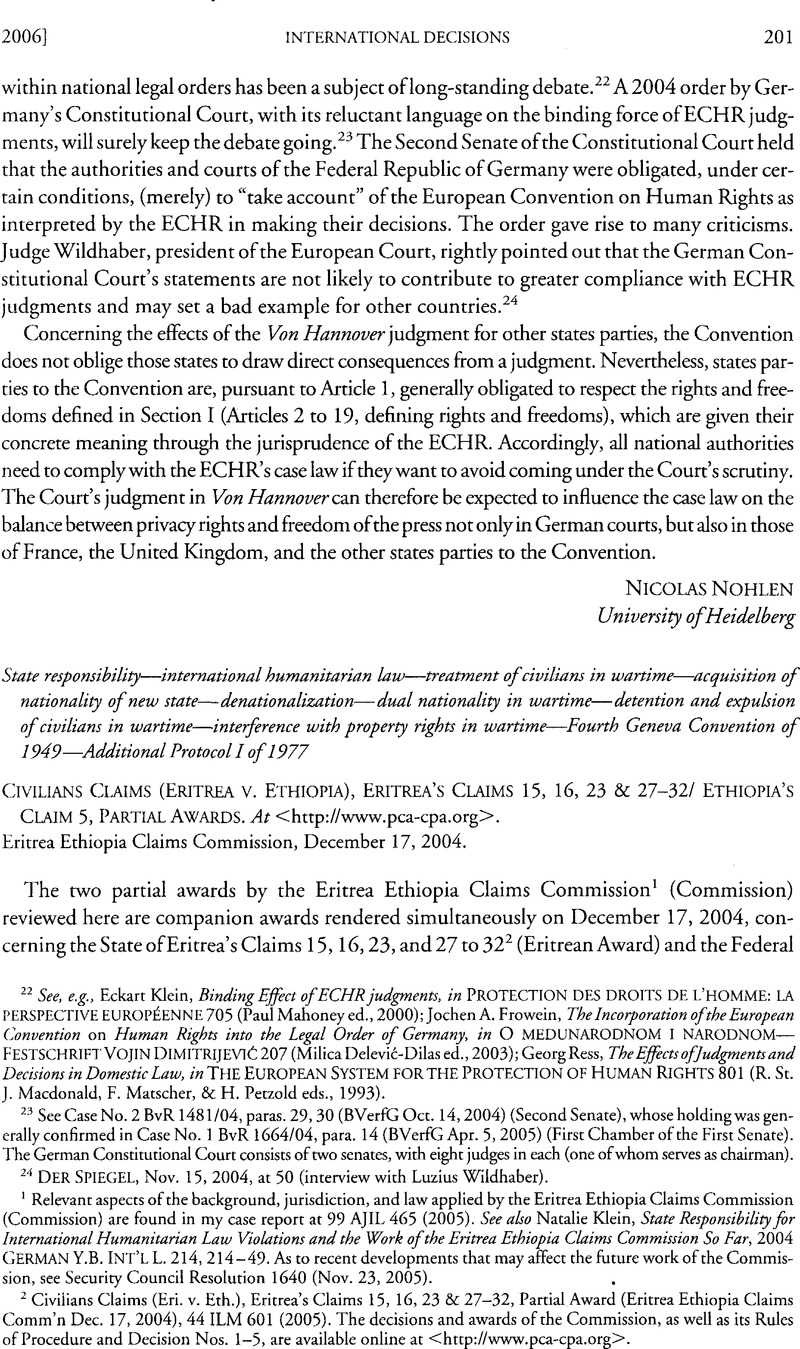Published online by Cambridge University Press: 27 February 2017

1 Relevant aspects of the background, jurisdiction, and law applied by the Eritrea Ethiopia Claims Commission (Commission) are found in my case report at 99 AJIL 465 (2005). See also Klein, Natalie State Responsibility for International Humanitarian Law Violations and the Work of the Eritrea Ethiopia Claims Commission So Ear, 2004 German Y.B. Intt L. 214, 214–49.Google Scholar As to recent developments that may affect the future work of the Commission, see Security Council Resolution 1640 (Nov. 23, 2005).
2 Civilians Claims (Eri. v. Eth.), Eritrea’s Claims 15, 16, 23 & 27-32, Partial Award (Eritrea Ethiopia Claims Comm’n Dec. 17, 2004), 44 ILM 601 (2005). The decisions and awards of the Commission, as well as its Rules of Procedure and Decision Nos. 1-5, are available online at <http://www.pca-cpa.org>.
3 Civilians Claims (Eth. v. Eri.), Ethiopia’s Claim 5, Partial Award (Eritrea Ethiopia Claims Comm’n Dec. 17, 2004), 44 ILM 630 (2005).
4 See Article 5(9) of the Agreement Between the Government of the Federal Democratic Republic of Ethiopia and the Government of the State of Ethiopia, Dec. 12, 2000, 40 ILM 260 (2001).
5 In contrast, Claims 27 to 32 were brought on behalf of named claimants (Eritrean Award, paras. 158-60).
6 The result of the referendum was that almost 99 percent of votes favored Eritrean independence. Ethiopia recognized Eritrea’s sovereignty and independence shortly thereafter. Eritrea became a member of the United Nations on May 28, 1993 (Eritrean Award, para. 7).
7 Geneva Convention [No. 4] Relative to the Protection of Civilian Persons in Time of War, Aug. 12, 1949, 6 UST3516, 75 UNTS 287 (see Eritrean Award, para. 82). The Commission also indicated that where expulsions were not conducted or authorized by the state, but by local authorities, they were unlawful under international law (id., para. 98).
8 Protocol Additional to the Geneva Conventions of Aug. 12, 1949, and Relating to the Protection of Victims of International Armed Conflicts, June 8, 1977, 1125 UNTS 3. The Commission considered Article 75 of Additional Protocol I to be a summary of the basic human rights rules most important in wartime (Eritrean Award, paras. 27-31, 108; Ethiopian Award, paras. 24-29).
9 Responsibility was attributable to Ethiopia because these actions “occurred in its sovereign territory and involved state agents whose misconduct Ethiopia did not prevent.” The award does not explain, however, why local farmers were considered to be “state agents” or were otherwise regarded as exercising governmental authority (Eritrean Award, para. 89).
10 With regard to this last violation, the Commission also cited Article 23(g) of the Hague Regulations (annexed to the Convention Respecting the Laws and Customs of War on Land, Oct. 18,1907,36 Stat. 2277,1 Bevans631) (see Ethiopian Award, para. 132).
11 Moreover, Decision No. 3 does not explain why monetary compensation was considered more appropriate than restitution, particularly given that the International Law Commission has taken the position that restitution “comes first among the forms of reparation.” Report of the International Law Commission on the Work of Its Fifty-third Session, UN GAOR, 56th Sess., Supp. No. 10, at 238, UN Doc. A/56/10 (2001) (para. 3 of commentary on Article 35 of the Articles on Responsibility of States for Internationally Wrongful Acts).
12 See, e.g., Klein, supra note 1, at 263-64 (questioning an earlier determination of the Commission to award compensation in respect of a claim that had requested an apology).
13 In the Eritrean Award, for example, only six claims (Claims 27-32) were filed by Eritrea on behalf of named individuals. Eritrea’s other claims in that award involved losses, damages, and injuries suffered by many thousands of unnamed victims (Eritrean Award, para. 18).
14 This precise issue arose in Nemariam v. Federal Democratic Republic of Ethiopia, 315 F.3d 390 (D.C. Cir. 2003), an appeal in a suit filed by Eritreans of Eritrean origin, descent, or nationality seeking recovery against Ethiopia for property damage resulting from the Eritrea-Ethiopia armed conflict of 1988-2000. The U.S. court of appeals there concluded “that the [Eritrea Ethiopia Claims] Commission’s inability to make an award directly to Nemariam, and Eritrea’s ability to set off Nemariam’s claim, or an award to Eritrea based upon her claim, against claims made by or an award in favor of Ethiopia, render the Commission an inadequate forum.” Id. at 395. Of interest also is the court’s reference to an Eritrean memorandum to the Commission indicating that “Eritrea believes that, as a general matter, awards should be given directly to claimants. . . . Financial compensation for large amounts of property damage should also be given directly to the individual victims.” In that same document, however, Eritrea added that “the practical difficulties of individual distribution might outweigh the desirability of individualized compensation.” Zs/. at 394.
15 See, e.g., Zegveld, Liesbeth Remedies for Victims of Violations of International Humanitarian Law, 85 Int’l Rev. Red Cross 497 (2003)CrossRefGoogle Scholar; Emanuela-Chiara, Gillard Reparation for Violations of International Humanitarian Law, 85 Int’l Rev. Red Cross 529 (2003)Google Scholar; UN Comm’n on Human Rights Res. 2005/35 (Apr. 19), UN Doc. E/CN.4/2005/134 (Pt. I), at 135 (“Basic Principles and Guidelines on the Right to a Remedy and Reparation for Victims of Gross Violations of International Human Rights Law and Serious Violations of International Humanitarian Law”).